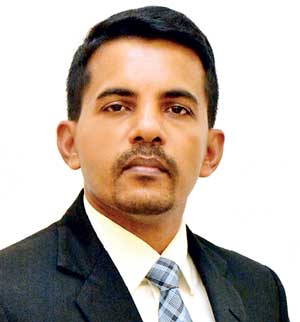Saturday Feb 21, 2026
Saturday Feb 21, 2026
Tuesday, 28 November 2017 00:00 - - {{hitsCtrl.values.hits}}
Management Consultant Samantha Rathnayke from the Postgraduate Institute of Management of the University of Sri Jayewardenepura is to address an international conference on ‘Future Work Organizations: Perspectives, Issues and Challenges’ organised by the Sona School of Management on 29 and 30 December at Goa University, India. 
In addition to the address, he is to chair research and other parallel sessions during the conference.
The keynote speaker of the conference will be Prof. Kishore Kulkarni - Distinguished Professor of Economics at Metropolitan State University of Denver, the US. Ratnayake is to make his contribution under the theme of ‘Future workforce: yesterday to tomorrow’. Eminent speakers representing diverse fields are to address the sessions such as Thyagu Valliappa - Founder and CEO of SAM-Bangalore; Dr. Gour Gobinda Goswami - Treasurer, North South University, Bangladesh; Prof Nikunj Dalal - Oklahoma State University, the US; Debabrat Dash - GM HR, Tata Steel-Odisha; Somick Goswami - Partner, PricewaterhouseCoopers, India; Prof. Debu Mukerji - Management, Consultant/Director, Independent Leadership and Management Consulting, Sydney; Prof. Anil Rao Paila - Senior Dean, Welingkar, Institute of Management, Bengaluru; Mita Dixit - Program Head, Lead to Transform Family Business, S.P Jain-Mumbai; Prof. Swarup. K. Mohanty - Director, Sona School of Management-Salem; Chocko Valliappa - Founder and CEO, Vee Technologies, Bangalore; Prof. K.B. Akhilesh - DOMS, Indian Institute of Science-Bangalore; Sai Kavitha – Vice President and Country Head, Innovatia Canada and India and Prof. Sabur Khan - Chairman, Daffodil International University, Bangladesh.
This global conference covers the leap from the linear to non-linear world of organisations and from the known to the unknown by examining areas such as principles which are guiding the success of 21st Century work organisations; what truly binds in networked organisations; exploration of information technology versus other options for meaningfulness; how a work organisation makes the shift from just spreading information around a network to building new knowledge; what important role technology will play to shape the future of work organisations; how work organisations will balance the need for radical change with the need for strategic continuity; what should leaders do to ensure that their corporate work culture will be a strategic asset rather than a change anchor to meet the future need; how the roles and responsibilities of the work within the organisations will take shape; and how the organisation’s responsibilities will be redefined.